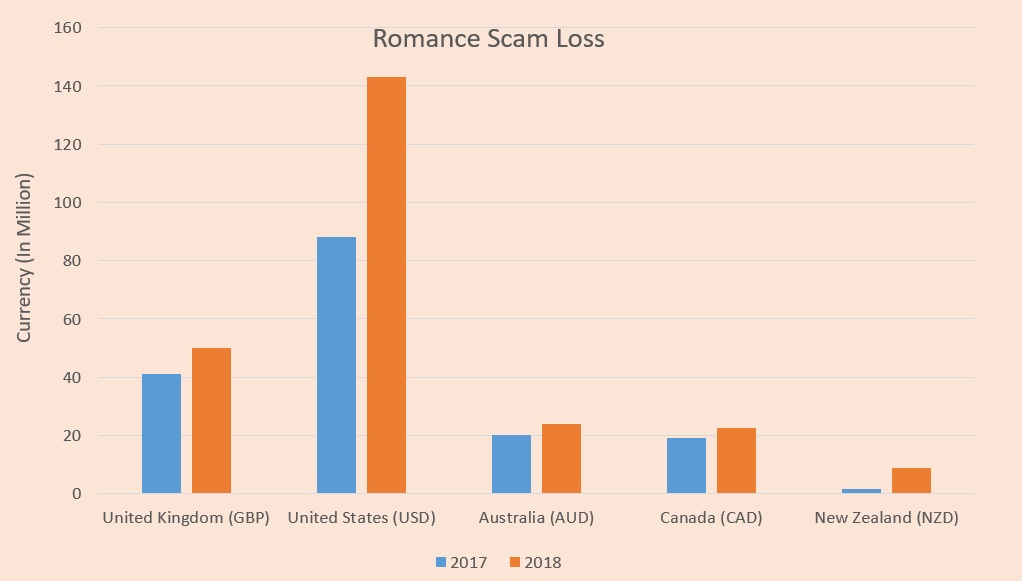The movie ‘You’ve got a mail‘ is one of the tellows’ team favorite movies. But my readers, how many of us can become Joe and Kathleen in real life? Unfortunately, more people are falling victims to ‘romance scams’ regardless of gender, according to the official information* of many countries. Let us have a look at the figure:

*Information from ACCC, FTC, Action Fraud, RCMP and Netsafe.
The numbers above are surprisingly alarming. In the US, the losses of romance scams rose from $33M to $143M in 2015 to 2018 as stated in FTC. Online dating becomes more popular and common nowadays, thanks to the technology we can meet endless potential romantic partners online. However, we also become more vulnerable when there are scammers try to take advantages of the online dating platforms.
According to Independent.co.uk, two women from Northern Ireland lost more than £100,000 in 2 weeks early this year. One of the scammers claimed to be in the US army and was being held by authorities in Africa and needed money to get out. The police have also expressed concern that the actual numbers would be way higher as victims are usually too embarrassed to report they have been scammed in a romance fraud. In the US, the median reported loss to romance scam is $2600, about seven times higher than the median loss across all other fraud types, according to FTC. Let’s check out how scammers approach their victims.

Catfishing
Romance scammers mostly approach potential victims through online dating websites, and gain trust with several cloned yet very convincing social media profiles such as facebook. In general, the identity of the scammer, such as personal information and picture, can be based on a real life person or completely fictional. They usually come with a highly educated and professional background with a nature of working aboard, in order to to build a trustworthy figure.
They tend to show strong emotion in a very short period of time, and try to convince the victims to share more intimate contact details such as social media profile, email address and phone number. Scammers will spend weeks to months to gain trust of the victims, even send gifts or claim to visit. Once the defense of the victims is fully down, the scammers will ask for financial details, or claims to have a emergency and ask the victim to wire money. Examples of common tricks including in need of money for hospital expenses him/ herself or for family members; to visit the victim; as involved in legal situation in a foreign country and etc.
To avoid being the next victim, beware of the following behaviors:
1. Asking for money without meeting in real life
2. Send you valuable goods/ wire money to your bank account and ask you to resend the goods somewhere else/ transfer money to someone else
(This action is possibly a type of money laundering, which is considered to be a criminal activity. Never transfer money for anyone.)
3. Quick to show affection and claim love
4. Try to get your financial information and status in a short period of time
It is highly suggested to report any suspicious person or loss to the official government website. Also, you can also join tellows to become a registered member and check out our app to avoid romance scammers. Next time you can search their numbers on tellows and see if it is a blacklisted number!
tellows hopes you enjoyed the article. Follow us on Medium, facebook, twitter to get the latest information of phone scams! We recently joined Instagram, give us a like there and don’t forget to hashtag #tellows when you post something related to phone scams!
Your tellows team